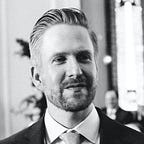Bonding Over Something Real
My campaign story began on January 3rd, 2008 — the night we won the Iowa primary.
I was fresh out of college, living in D.C., and working at REI. One of my dearest friends from college was a field organizer for then-Senator Barack Obama in Lexington, South Carolina. She seized on the momentum of the night and talked me into coming to down be her volunteer intern for the three weeks leading up to the South Carolina primary. Seemed harmless enough. I thought it would be a nice opportunity to get a little political experience I could take back to D.C. In no way did I think that this would actually be the first step of a journey that has shaped my life, my world view, and my soul.
Everyone has a story like that. Right? About how everything changed, how you found your identity, got inspired, etc.? Have you ever stopped to think about why exactly? Really, why did everything change? What actually happened? What was the thing that did it to you? What was a speech? Was it your volunteers? Or your colleagues? Did it happen immediately or over time? Was there a specific moment when the synapses connected and the life of the campaign — the movement — was dramatically breathed into you?
For me, it was those first three weeks on the campaign in South Carolina and here’s why: I physically watched a group of people from different races, ages, religions, sexual orientations, income levels — and sometimes even political affiliations — bond over something real. Every night, someone new would come in and be welcomed with open arms and without questions. I watched them work, I watched them laugh, and I watched them share. And then on primary night, I saw them cry. I still remember one of our staging location directors — a retired teacher — scream/cry precinct results to the crowd gathered in the office around her as she heard them through the other end of the phone.
What happened in that room was real. It was so real. Those people bonded over something bigger than themselves was real. The love in that room was palpable. People were capable of it then, they can do it again.
As I’ve tried to sort through the rubble of the last few months, I’ve been thinking a lot about those three weeks in Lexington, South Carolina. And I know some famous guy once said “hope is not blind optimism.”
How do we get that back again? I think it starts with us — or at the very least, I don’t know of a group more qualified to do it. The Obama Alumni family is literally an army of organizers, facilitators, and persuaders — all of whom have witnessed the reality of bonding over something real. We have all witnessed respect, empowerment, and inclusion.
So how do we do it? How can we use our shared skills and experiences to start bringing people together again? What role can we play in defining or planning “the next Barack Obama” — however you want to refer to the catalyst for the next movement?
1. Run — why not? Seriously, why not? Barack Obama was 34 years old when he first ran for a state senate seat. How old are you and how different is your resume from his at your age? It’s a bold step, but you won’t be alone — organizations like RunForSomething.net (founded by Obama Alumni) and Crowdpac are making it easier to figure it out, get help, and get a campaign off the ground.
2. Organize — if you’re reading this, you’re probably already plugged into your local OFA group. If you’re not, plug in now. Want to do more? Check out SwingLeft — a site where you can find your closest 2018 swing district. Let’s start painting the map blue again.
3. Persuade — maybe it’s as simple as a conversation, especially with someone you don’t agree with. It was for me. It’s hard right now to feel open, optimistic, or… hopeful. But I’m keeping in mind it was openness, optimism, and hope that galvanized that field office in Lexington, South Carolina.
